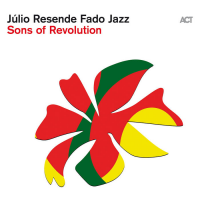Home » Jazz Articles » Album Review » Julio Resende: Sons of Revolution
Julio Resende: Sons of Revolution
"Without the revolution, I wouldn't even exist. My father is from Angola, he emigrated to Portugal after the revolution, and met my mother. The freedom to express myself is one of the dearest things to me, and jazz is the music that enables that the most—without any borders or restrictions," says Júlio Resende.
After Da Alma (Clean Feed, 2007), the first title under his own name, Resende recorded Assim Falava Jazzatustra (Clean Feed, 2009) and You Taste Like a Song (Clean Feed, 2011). He followed these albums with two incursions into fado. First, with a tribute to the great Portuguese singer Amália Rodrigues, Amália by Júlio Resende (Valentim de Carvalho, 2013), and Fado & Further (Valentim de Carvalho, 2015). The versatility of the pianist was demonstrated with two very different musical explorations: first, into poetry, Poesia Homónima (Valentim de Carvalho, 2016), and then with electronic music, Cinderella Cyborg (Sony Music, 2018). A further visit to fado music was Fado Jazz Ensemble (Sony Music, 2020).
To fully understand the new album, one needs to go back to 2007 and to Resende's first record under his own name. The song was called "Filhos da Revolução" (sons of revolution). The pianist showed his fusion skills: mixing tradicional Portuguese and African music, fado and jazz.
"'Filhos da Revolução' was already an exploration of what it means to be Portuguese and what being a musician in Portugal means, linked to all Portuguese-speaking African countries and to all of this history, a combination of what was once, before war, and became what was more important to me, which is solidarity between people," says Resende. "The music refers to a certain moment in the history of the revolution, before or after, and tries to inspire improvisation from that spot. All themes are a starting point for a musical dialogue based on these ideas."
The presence of fado is well marked by the unique sound of the Portuguese guitar of Bruno Chaveiro (a regular with fado stars Carminho and Ana Moura) who joins Resende in a duet on the first two tracks, "Portugal Celebrates with Red Flowers"—inspired on the classic fado "A Rosinha dos Limões"—and "Liberdade Desgarrada."
The other two members of the quartet, André Rosinha (double bass) and Alexandre Frazão (drums and percussion) appear for the first time only in the third song, when the record turns to Africa, with "Mr Fado Goes To Africa For The First Time," followed by "End of Colonial War! No Saudade."
The sound of Bruno Chaveiro's guitar strings shines again on "Mano a Mano Now We Are Brothers" and "Peace at Last." The celebration of the union of those two "worlds" drove Júlio Resende to write "Anagrama The Retornados Love Two Lands."
"Portugal Dances Another Mariquinhas" is inspired by the popular fado "Casa da Mariquinhas," that was performed by big names like Alfredo Marceneiro or Amália Rodrigues. Other pre-revolution inspiration came from José Afonso's "Traz Outro Amigo Também" (1970), which lead to a brilliant "Improvisation About Traz Outro Amigo Também"
Resende also brought the fado to the jazz, with a magnificient version of "Poinciana," a creation by one of his idols, Ahmad Jamal. "'Fado Poinciana' is a song dedicated to Jamal, who passed away in 2023 and who was very inspiring for all pianists on the jazz scene. "This is a celebration and a tribute to the most famous song he played," says Resende. "What I wanted was to give a very personal and fado-like touch to something that didn't seem to have fado within it; but it does. Above all, the love that Ahmad Jamal gave us with his inspired music, full of silence, has a lot of freedom (jazz) and beauty within (fado)."
The final track is a ballad, dedicated to the singer-songwriters of the 1960s and '70s, and is the only vocal track, sung by Salvador Sobral (winner of the 2017 Eurovision Song Festival) with lyrics by João Monge.
The Carnation Revolution established democracy in Portugal and put an end to the colonial wars. After that day, Charlie Haden, who played at the 1971 Cascais Jazz Festival and dedicated "Song for Che" to the African freedom movements, was again welcomed to Portugal. Fifty years later, there is no better way to pay tribute to the Revolution, than an exciting and emotional album, presented in a global, modern jazz language.
Track Listing
Portugal Celebrates with Red Flowers; Liberdade Desgarrada; Mr. Fado Goes to Africa for the First Time; End of Colonial War! No Saudade; Mano a Mano - Now We Are Brothers; Peace at Last; Anagrama - The Retornados Love Two Lands; Portugal Dances Another Mariquinhas; Improvisation About Traz Outro Amigo Também; Fado Poinciana for Ahmad Jamal; A Casa Dela Her House.
Personnel
Album information
Title: Sons of Revolution | Year Released: 2023 | Record Label: ACT Music
Tags
PREVIOUS / NEXT
Support All About Jazz
 All About Jazz has been a pillar of jazz since 1995, championing it as an art form and, more importantly, supporting the musicians who make it. Our enduring commitment has made "AAJ" one of the most culturally important websites of its kind, read by hundreds of thousands of fans, musicians and industry figures every month.
All About Jazz has been a pillar of jazz since 1995, championing it as an art form and, more importantly, supporting the musicians who make it. Our enduring commitment has made "AAJ" one of the most culturally important websites of its kind, read by hundreds of thousands of fans, musicians and industry figures every month.





















